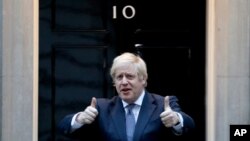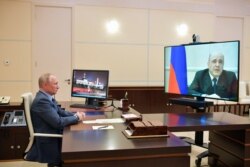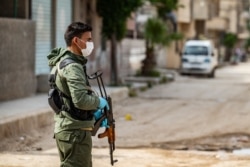British Prime Minister Boris Johnson said Thursday that Britain is past the peak of the coronavirus outbreak and the number of new infections is on a downward slope.
In his first major address after recovering from COVID-19, Johnson said he would announce a plan next week on how the country's economy and lifestyle are to move forward after the pandemic that has killed close to 27,000 people in Britain and infected about 172,500.
Johnson was optimistic about a coronavirus vaccine developed by Oxford University scientists and the British drug company AstraZeneca. If the vaccine proves to be effective, it could become widely available in the world this fall.
Many European countries have already begun gradually reopening or have plans to do so in the coming days. The economy in the eurozone – European countries that use the common euro currency – shrank a record 3.8% in the first quarter of the year.
Russia
Meanwhile, Russian Prime Minister Mikhail Mishustin announced Thursday he had tested positive for the coronavirus. State television showed his video call with Russian President Vladimir Putin. Mishustin will be replaced by First Deputy Prime Minister Andrei Belousov while he is in self-isolation.
Russia has more than 100,000 COVID-19 cases and about 7,100 deaths. The country's economy has been hit by huge losses of oil revenue resulting from the global oil glut caused by worldwide shutdowns.
Russia's Tass news agency quoted Putin on Thursday as saying the country's economic recovery plan must consider a new reality.
"We know the world is changing. The crisis relating to the coronavirus pandemic has influence on the key markets, on the system of cooperative ties. Companies, including Russian ones, are looking for and quickly implementing fundamentally new business models," Putin said.
United States
The U.S. government also is looking for ways to restart its economy, which suffered a 4.8% loss in the first quarter, with more than 30 million unemployment claims filed in the past six weeks.
The Trump administration is not planning to extend federal coronavirus restrictions that expire Thursday, focusing instead on its efforts to work with states on plans to reopen the country.
U.S. governors have been deciding when and at what pace to relax restrictions on nonessential businesses and group gatherings and stay-at-home orders in their states. Some states have already begun phasing out those restrictions, even though the pandemic remains rampant.
More than 1 million people in the United States have been infected with the coronavirus, and about 61,500 have died from COVID-19.
Asia
Discussions about relaxing lockdown orders are also taking place in Asia. In Japan, Prime Minister Shinzo Abe said Thursday his government is consulting experts about whether to extend a state of emergency that is set to expire May 6.
Japan has about 14,000 confirmed COVID-19 cases, and Abe said the situation remains "severe."
Other regions
The United Nations is worried about the outbreak of the coronavirus in poor and war-torn countries that could not take care of their sick.
U.N. humanitarian chief Mark Lowcock told the Security Council that there are 44 confirmed cases and four deaths in Syria, a country he said cannot be expected "to cope with a crisis that is challenging even the wealthiest nations."
In Yemen, health officials reported the country's first two coronavirus deaths, as well as a cluster of new cases in the southern port city of Aden that has been a focal point in a five-year civil war.
The World Bank said developing countries would be hardest hit, particularly those in sub-Saharan Africa, where nearly half of the continent's job losses have occurred.
It also said the economic downturn in South Asia would likely be the region's worst in 40 years.
The United Nations estimates that 8% of the world's population, about 500 million people, could be forced into poverty by year's end.
Close to 3.3 million people worldwide have been infected with the coronavirus that originated in Wuhan, China. About 232,000 have died.







